Speaker Bios
Madeline Balaam
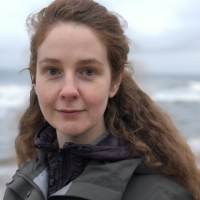 Madeline Balaam is a Professor in Interaction Design at KTH Royal Institute of Technology, where she works with a team of amazing researchers on designing technologies and interactions at the intersection of intimate health, the body and touch. She takes a feminist perspective to her research which is perhaps best illustrated through the kinds of topics and issues that her design work examines and troubles. Madeline publishes her work extensively at ACM CHI and ACM DIS and several of her papers have been awarded best paper awards. Her work is funded by Vetenskåpsrådet, Digital Futures and the European Research Council.
Madeline Balaam is a Professor in Interaction Design at KTH Royal Institute of Technology, where she works with a team of amazing researchers on designing technologies and interactions at the intersection of intimate health, the body and touch. She takes a feminist perspective to her research which is perhaps best illustrated through the kinds of topics and issues that her design work examines and troubles. Madeline publishes her work extensively at ACM CHI and ACM DIS and several of her papers have been awarded best paper awards. Her work is funded by Vetenskåpsrådet, Digital Futures and the European Research Council.
Jane Seale
 Jane Seale is a Professor Emerita in the Faculty of Wellness, Education and Language Studies at the Open University in the UK. Jane’s teaching and research interests lie at the intersections between disability, technology and inclusion. Her work focuses in particular on the role that technologies play in the lives of people with learning disabilities (intellectual impairments) and the factors that influence or sustain the digital exclusion of disabled learners. Jane’s methodological interest is the development and evaluation of participatory research methods that promote voice and empowerment for disabled research partners. Jane has recently completed a research study entitled “Accessible Resources for Cultural Heritage EcoSystems” which used participatory methods to engage people with sensory and intellectual impairments in working with technology companies to design and evaluate technologies that facilitate their access to museums. Jane has drawn on her experiences to edit a recent book 'A Research Agenda for Technology and Disability (opens in a new tab)’ published by Edward Elgar Publishing.
Jane Seale is a Professor Emerita in the Faculty of Wellness, Education and Language Studies at the Open University in the UK. Jane’s teaching and research interests lie at the intersections between disability, technology and inclusion. Her work focuses in particular on the role that technologies play in the lives of people with learning disabilities (intellectual impairments) and the factors that influence or sustain the digital exclusion of disabled learners. Jane’s methodological interest is the development and evaluation of participatory research methods that promote voice and empowerment for disabled research partners. Jane has recently completed a research study entitled “Accessible Resources for Cultural Heritage EcoSystems” which used participatory methods to engage people with sensory and intellectual impairments in working with technology companies to design and evaluate technologies that facilitate their access to museums. Jane has drawn on her experiences to edit a recent book 'A Research Agenda for Technology and Disability (opens in a new tab)’ published by Edward Elgar Publishing.
João Guerreiro
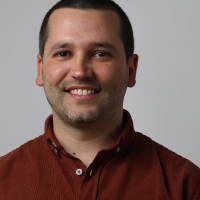 João Guerreiro is a tenured faculty member at Faculdade de Ciências, Universidade de Lisboa, Portugal, and an integrated researcher at LASIGE. Previously, he was a Postdoctoral Researcher at Carnegie Mellon University. His research focuses on improving blind people’s access to the physical and digital worlds using novel non-visual interaction techniques and systems. His recent work aims to make virtual environments and immersive virtual reality (VR) more accessible to blind people. João publishes his research regularly at the premiere venues in human-computer interaction (HCI), Accessible Computing, and VR (e.g., ACM CHI, ASSETS, and IEEE VR) and has been awarded five Best Paper distinctions. He has served as General Chair of MUM’22, is a regular organizing or program committee member of CHI and ASSETS, and is a member of the ACM TACCESS Editorial Board.
João Guerreiro is a tenured faculty member at Faculdade de Ciências, Universidade de Lisboa, Portugal, and an integrated researcher at LASIGE. Previously, he was a Postdoctoral Researcher at Carnegie Mellon University. His research focuses on improving blind people’s access to the physical and digital worlds using novel non-visual interaction techniques and systems. His recent work aims to make virtual environments and immersive virtual reality (VR) more accessible to blind people. João publishes his research regularly at the premiere venues in human-computer interaction (HCI), Accessible Computing, and VR (e.g., ACM CHI, ASSETS, and IEEE VR) and has been awarded five Best Paper distinctions. He has served as General Chair of MUM’22, is a regular organizing or program committee member of CHI and ASSETS, and is a member of the ACM TACCESS Editorial Board.
Asreen Rostami
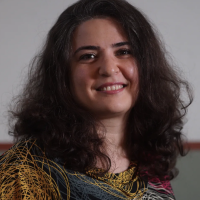 Asreen Rostami is a leading Human-Computer Interaction (HCI) researcher at the RISE Research Institutes of Sweden and an affiliated researcher and lecturer at the Department of Computer and Systems Sciences, Stockholm University. Her current work explores extended reality (XR) applications, including spatial computing, alongside the potential integration of large language models (LLMs). This includes examining the design and ethical implications of XR experiences across industrial, educational, and cultural domains. Her work is supported by funding from Vinnova and Digital Futures. At RISE, Asreen also leads the Human-Centred Cybersecurity research focus, aiming to expand the field by addressing societal challenges and opportunities alongside conventional technical concerns. She is a member of the steering committee for the ACM IMX conference, where she actively contributes and publishes her research in addition to ACM CHI and CSCW.
Asreen Rostami is a leading Human-Computer Interaction (HCI) researcher at the RISE Research Institutes of Sweden and an affiliated researcher and lecturer at the Department of Computer and Systems Sciences, Stockholm University. Her current work explores extended reality (XR) applications, including spatial computing, alongside the potential integration of large language models (LLMs). This includes examining the design and ethical implications of XR experiences across industrial, educational, and cultural domains. Her work is supported by funding from Vinnova and Digital Futures. At RISE, Asreen also leads the Human-Centred Cybersecurity research focus, aiming to expand the field by addressing societal challenges and opportunities alongside conventional technical concerns. She is a member of the steering committee for the ACM IMX conference, where she actively contributes and publishes her research in addition to ACM CHI and CSCW.
Frode Eika Sandnes
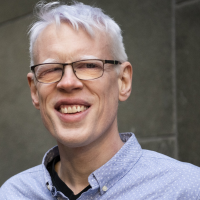 Frode Eika Sandnes is a full professor in the Department of Computer Science at the Faculty of Technology, Art and Design, Oslo Metropolitan University (OsloMet), and rewarded with status as a distinguished teaching fellow. He received a B.Sc. in computer science from the University of Newcastle upon Tyne, UK, and a Ph.D. in computer science from the University of Reading, UK. His research interests include human computer interaction generally and universal design and accessibility specifically. Dr. Sandnes was the primus motor for the establishment of the first master specialization in accessibility in Norway. He is an editorial member of the Universal Access in Information Society journal and has hosted several international conferences including NordiCHI. Sandnes is the Norwegian representative to IFIP Technical Committee on Human Computer Interaction (TC13). He was involved in the translation of WCAG2.0 into Norwegian, has written several textbooks and he has served on the board of the usability special interest group of the Norwegian Computer Society.
Frode Eika Sandnes is a full professor in the Department of Computer Science at the Faculty of Technology, Art and Design, Oslo Metropolitan University (OsloMet), and rewarded with status as a distinguished teaching fellow. He received a B.Sc. in computer science from the University of Newcastle upon Tyne, UK, and a Ph.D. in computer science from the University of Reading, UK. His research interests include human computer interaction generally and universal design and accessibility specifically. Dr. Sandnes was the primus motor for the establishment of the first master specialization in accessibility in Norway. He is an editorial member of the Universal Access in Information Society journal and has hosted several international conferences including NordiCHI. Sandnes is the Norwegian representative to IFIP Technical Committee on Human Computer Interaction (TC13). He was involved in the translation of WCAG2.0 into Norwegian, has written several textbooks and he has served on the board of the usability special interest group of the Norwegian Computer Society.
Katie Gaudion
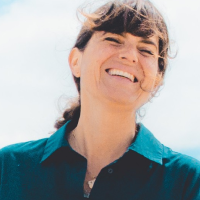 Katie Gaudion is a Design Consultant and Senior Research Associate at the Helen Hamlyn Centre for Design (HHCD), an inclusive design centre at the Royal College of Art in London. With a focus on neurodivergence, Katie has played a key role in expanding HHCD's approach to design methods that actively consider and involve the needs of neurodivergent individuals. She holds a PhD titled "A Designer’s Approach: How Can Autistic Adults with Learning Disabilities Be Involved in the Design Process?". Her research explored design methods to engage autistic individuals with limited verbal communication, focusing on meaningful ways to understand their needs, preferences, and desires. For nearly a decade, Katie has collaborated with neurodivergent individuals to create better-designed products, services, and environments. Her work spans a wide range of fields, including supported living accommodation, mental health hospitals, garden design, multisensory environments, healthcare services, street design, and, more recently, educational spaces. Katie also contributed to the development of Publicly Available Specification (PAS) 6463, a design standard for the built environment that addresses neurodivergence. As a neurodivergent individual herself, Katie is passionate about promoting the idea that the design community should recognise, address, and embrace the diverse sensory perceptual experiences linked to neurodivergence. She advocates that by understanding and respecting these differences, we can create a more innovative and inclusive society.
Katie Gaudion is a Design Consultant and Senior Research Associate at the Helen Hamlyn Centre for Design (HHCD), an inclusive design centre at the Royal College of Art in London. With a focus on neurodivergence, Katie has played a key role in expanding HHCD's approach to design methods that actively consider and involve the needs of neurodivergent individuals. She holds a PhD titled "A Designer’s Approach: How Can Autistic Adults with Learning Disabilities Be Involved in the Design Process?". Her research explored design methods to engage autistic individuals with limited verbal communication, focusing on meaningful ways to understand their needs, preferences, and desires. For nearly a decade, Katie has collaborated with neurodivergent individuals to create better-designed products, services, and environments. Her work spans a wide range of fields, including supported living accommodation, mental health hospitals, garden design, multisensory environments, healthcare services, street design, and, more recently, educational spaces. Katie also contributed to the development of Publicly Available Specification (PAS) 6463, a design standard for the built environment that addresses neurodivergence. As a neurodivergent individual herself, Katie is passionate about promoting the idea that the design community should recognise, address, and embrace the diverse sensory perceptual experiences linked to neurodivergence. She advocates that by understanding and respecting these differences, we can create a more innovative and inclusive society.
Letizia Jaccheri - ACM Distinguished Speaker
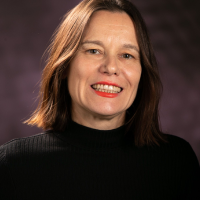 Letizia Jaccheri is a Professor at the Department of Computer Science of the Norwegian University of Science and Technology, Norway. Jaccheri has been teaching courses in software engineering at various levels. From 2013 to 2017 she was department head for the Computer Science department at NTNU. She is ACM Distinguished speaker since 2018. She has got two gender equality prizes for her work to attract and retain women to computer science. Letizia Jaccheri has a long record of research leadership in interdisciplinary projects with a focus on gender and software engineering. She is in involved in several research projects, and she was leading the COST Action CA19122 Gender Balance in Informatics EU GAIN (link eugain.eu) with 155 members from 39 European countries from 2020 to 2024. Letizia has plans to continue to contribute to address the issue of diversity in software engineering.
Letizia Jaccheri is a Professor at the Department of Computer Science of the Norwegian University of Science and Technology, Norway. Jaccheri has been teaching courses in software engineering at various levels. From 2013 to 2017 she was department head for the Computer Science department at NTNU. She is ACM Distinguished speaker since 2018. She has got two gender equality prizes for her work to attract and retain women to computer science. Letizia Jaccheri has a long record of research leadership in interdisciplinary projects with a focus on gender and software engineering. She is in involved in several research projects, and she was leading the COST Action CA19122 Gender Balance in Informatics EU GAIN (link eugain.eu) with 155 members from 39 European countries from 2020 to 2024. Letizia has plans to continue to contribute to address the issue of diversity in software engineering.
Sophia Alexandersson
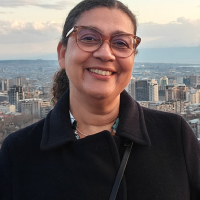 Sophia Alexandersson is the chief executive and artistic director of ShareMusic and Performing Arts, Swedish knowledge centre for artistic development and inclusion. Sophia has extensive experience of inclusive arts and comprehensive experience as a project leader of both national and international projects. She has lead workshops and held lectures in several countries on empowering disabled people through the arts to be visible in the society and show their potential. With a background as a musician and pedagogue with a master’s in fine arts from the Royal College of Music in Stockholm and a Postgraduate in Performance and Communication from the Guildhall School of Music and Drama in London, she has a strong commitment to everyone's right to arts and culture.
Sophia Alexandersson is the chief executive and artistic director of ShareMusic and Performing Arts, Swedish knowledge centre for artistic development and inclusion. Sophia has extensive experience of inclusive arts and comprehensive experience as a project leader of both national and international projects. She has lead workshops and held lectures in several countries on empowering disabled people through the arts to be visible in the society and show their potential. With a background as a musician and pedagogue with a master’s in fine arts from the Royal College of Music in Stockholm and a Postgraduate in Performance and Communication from the Guildhall School of Music and Drama in London, she has a strong commitment to everyone's right to arts and culture.
Nigel Osborne
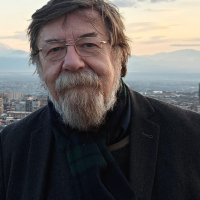 Nigel Osborne MBE is a composer and Emeritus Professor of Music and Human Sciences at the University of Edinburgh. He is also Distinguished International Professor at Peking University and has held advisory or visiting roles at institutions including the University of Rijeka, Harvard, UCLA, CalArts, the Irish World College, the Vienna-Prague-Budapest Summer Academy, and the Institute for Music and Neurologic Function in the Bronx. He has pioneered the use of music to support children affected by conflict in regions such as the Balkans, Caucasus, Middle East and Southeast Asia, publishing extensively on music and PTSD. He invented X-System, the first functioning computational model of the musical brain, and is currently collaborating with Johns Hopkins University, Srebrnjak Children's Hospital in Zagreb, Share Music, and Stanford University on projects involving music and health, including platforms for remote co-creation by disabled musicians. He has received the Queen’s Prize, Thorne EMI Prize, the Freedom Prize of the Peace Institute Sarajevo, and the Doubleday Medal from the University of Manchester Medical School for his work with traumatised children. His compositions have earned him the International Opera Prize of Radio Suisse Romande and City of Geneva, the Gaudeamus Prize, the Koussevitzky Award, and a BASCA Award for Inspiration. He is a former co-Chair of the Arts in Society Global Agenda Council of the World Economic Forum and has advised the UK Parliament, US Congress, and the EU External Action Services. He is currently Field Officer in the Beqaa Valley, Lebanon, for SAWA for Development and Aid.
Nigel Osborne MBE is a composer and Emeritus Professor of Music and Human Sciences at the University of Edinburgh. He is also Distinguished International Professor at Peking University and has held advisory or visiting roles at institutions including the University of Rijeka, Harvard, UCLA, CalArts, the Irish World College, the Vienna-Prague-Budapest Summer Academy, and the Institute for Music and Neurologic Function in the Bronx. He has pioneered the use of music to support children affected by conflict in regions such as the Balkans, Caucasus, Middle East and Southeast Asia, publishing extensively on music and PTSD. He invented X-System, the first functioning computational model of the musical brain, and is currently collaborating with Johns Hopkins University, Srebrnjak Children's Hospital in Zagreb, Share Music, and Stanford University on projects involving music and health, including platforms for remote co-creation by disabled musicians. He has received the Queen’s Prize, Thorne EMI Prize, the Freedom Prize of the Peace Institute Sarajevo, and the Doubleday Medal from the University of Manchester Medical School for his work with traumatised children. His compositions have earned him the International Opera Prize of Radio Suisse Romande and City of Geneva, the Gaudeamus Prize, the Koussevitzky Award, and a BASCA Award for Inspiration. He is a former co-Chair of the Arts in Society Global Agenda Council of the World Economic Forum and has advised the UK Parliament, US Congress, and the EU External Action Services. He is currently Field Officer in the Beqaa Valley, Lebanon, for SAWA for Development and Aid.
Rachel Freire
 Rachel Freire is a transdisciplinary artist, designer and researcher best known for eTextiles, elegant wearables, refined leatherwork and their striking futuristic aesthetic. From crafting the Stillsuits in Villeneuve’s Dune to designing Imogen Heap’s gestural musical interface, the MiMU Gloves, Rachel brings hallmark ingenuity and subversive sensibilities to a uniquely integrative practice that transforms science fiction and theory into embodied science fact. Currently an affiliate researcher in Human-Computer Interaction with SensInt at the Max Planck Institute for Informatics, they have received awards for materials innovation and originally trained in Design for Performance at Central Saint Martins. With a focus on the essential role of collaboration in constructing more sustainable, equitable and aesthetically compelling futures, Rachel believes knowledge should be free, and that if we want better futures, we must nurture the skills to create them.
Rachel Freire is a transdisciplinary artist, designer and researcher best known for eTextiles, elegant wearables, refined leatherwork and their striking futuristic aesthetic. From crafting the Stillsuits in Villeneuve’s Dune to designing Imogen Heap’s gestural musical interface, the MiMU Gloves, Rachel brings hallmark ingenuity and subversive sensibilities to a uniquely integrative practice that transforms science fiction and theory into embodied science fact. Currently an affiliate researcher in Human-Computer Interaction with SensInt at the Max Planck Institute for Informatics, they have received awards for materials innovation and originally trained in Design for Performance at Central Saint Martins. With a focus on the essential role of collaboration in constructing more sustainable, equitable and aesthetically compelling futures, Rachel believes knowledge should be free, and that if we want better futures, we must nurture the skills to create them.
Sofia Thunberg
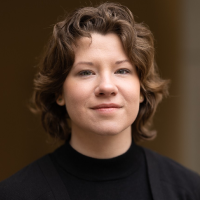 Sofia Thunberg is a postdoctoral researcher in Interaction Design at Chalmers University of Technology and holds a PhD in Cognitive Science. Her research is mainly in Human-Robot Interaction, and her interests are in the intersection of where social robots meet care. Her previous projects have especially involved care settings for older adults with dementia and children with autism, where social robot implementations have been investigated through a holistic approach, involving stakeholders such as municipal decision makers, care practitioners, caretakers, and family members.
Sofia Thunberg is a postdoctoral researcher in Interaction Design at Chalmers University of Technology and holds a PhD in Cognitive Science. Her research is mainly in Human-Robot Interaction, and her interests are in the intersection of where social robots meet care. Her previous projects have especially involved care settings for older adults with dementia and children with autism, where social robot implementations have been investigated through a holistic approach, involving stakeholders such as municipal decision makers, care practitioners, caretakers, and family members.
More to be announced soon






